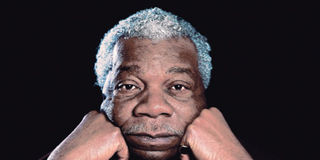Premium
Do men go through menopause?

What you need to know:
- Nutritional treatments for andropause focus on alleviating the symptoms, so you would take a combination of supplements in addition to making dietary changes. One of the first things you can do is to boost your protein intake – a diet that is higher in protein tends to raise testosterone levels.
Q: I am a 50 year-old man suffering from low sex drive, erectile dysfunction, and depression. I think I am going through menopause. Does this happen to men?
A: The word “menopause” means “end of periods” and since men do not have periods, menopause is not the correct term. However, as men get older, they do experience a decline in male hormones, and this can cause a cluster of rather distressing physical and emotional symptoms. This is what is now commonly referred to as andropause, probably what you’re experiencing.
This fall in testosterone levels is much slower than in women. However, symptoms can range from general fatigue and decreased muscle mass to impotence and loss of sex drive. If testosterone has declined, there appear to be two major causes: Stress and diabesity (obesity and diabetes).
The sex hormone, testosterone, and the stress hormone, cortisol, are made from the same raw material (progesterone). So if you are stressed, cortisol takes preference, leaving a testosterone deficit.
Diabesity then compounds this, since this is a condition that increases oestrogen levels in the body (oestrogen inhibits testosterone). Assuming you tick all the boxes, is testosterone supplementation the way to go? Well, at the moment, there is still a great deal of disagreement on whether the treatment is appropriate or safe.
After all, it took 30 years to discover that hormone replacement therapy (HRT) in women is not quite the panacea that people initially believed. I believe that hormones should be used only as a last resort since they can have serious risks (such as an increased risk of prostate cancer).
Nutritional treatments for andropause focus on alleviating the symptoms, so you would take a combination of supplements in addition to making dietary changes. One of the first things you can do is to boost your protein intake – a diet that is higher in protein tends to raise testosterone levels.
A strict vegetarian or vegan diet is more likely to be associated with lower testosterone levels, as is a high fibre one. Another thing you can do is to boost dietary levels of zinc. Zinc converts testosterone into oestrogen. Rich sources include shellfish, beans, nuts, and eggs. Losing a few pounds will also help. Alcohol too causes oestrogen levels to rise in the body, so limit your intake.
As for supplements, other than zinc, I would recommend milk thistle as it helps to eliminate waste, including excess oestrogen, from the body. Milk thistle also promotes a healthy liver and may therefore ease symptoms of andropause.
Lastly, for erectile dysfunction, consider the herb gingko biloba. It dilates the blood vessels, increasing blood flow to various parts of the body, hence its potential usefulness in erectile dysfunction.
When buying a supplement, choose an extract that contains at least 24 per cent flavone glycosides and six per cent terpene lactones. Alternatively, take a high-quality tincture. And do bear in mind that it may take up to 12 weeks to see improvement.
The writer is a clinical nutritionist and certified by the Nutritional Therapy Council in the UK. Please direct any questions about family nutrition to her on [email protected]




